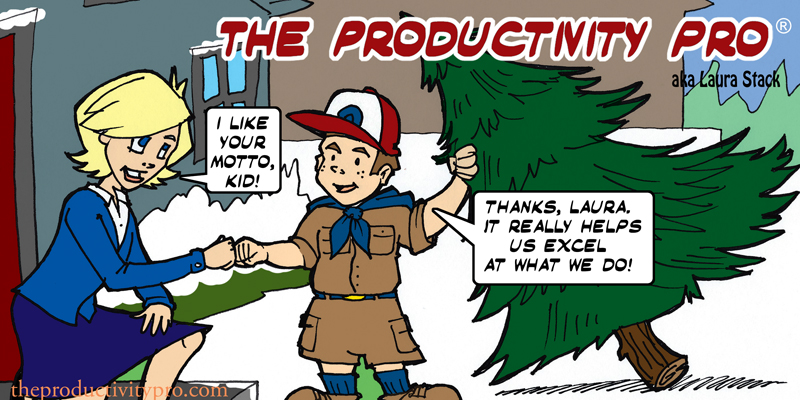
“Be prepared.”—Boy Scout Motto.
According to legend, Albert Einstein shared this characteristic with the late Steve Jobs, Facebook’s Mark Zuckerberg, and U.S. President Barack Obama: he pared his wardrobe down to a few simple outfits, so he didn’t have to worry about what to wear every morning. Whether it’s true or apocryphal for the great physicist remains uncertain, but it’s an established fact for the three aforementioned leaders. Simple routines represent a great way to triage your schedule and save time for what really matters.
If you think about it, that’s one way that advance preparation can improve your life. What other routines can you establish to prepare in advance and heighten productivity?
1. Marshal your resources the evening before. If you know you’ll need certain files, a specific binder, and a printed report to complete your first task early tomorrow morning, collect those resources before you leave the office that evening.
2. Do tomorrow’s to-do list today. A productive worker always keeps his or her task list at hand and knows what the next most important task is. If you try to compile your to-do list in the morning, it’s too late. You may not have a free moment later on, and then you’ll end up reacting all day instead of proactively structuring your time. In fact, it’s helpful to plan your week in advance, as long as you leave a little flexibility for the unexpected.
3. Visualize the next day the evening before. Is there anything special about tomorrow? Is it the date of the divisional manager’s monthly visit? The weekly staff meeting? Do you have five hours of meetings? Will you realistically be able to accomplish all the task you’ve outlined for yourself? Don’t obsess over your plans, but do prioritize and move tasks to other days that won’t be done.
4. Find the best system for everything, and tweak it as you go. We all do some experimentation some before we settle down into a productivity system that works best for us, whether it involves information tracking, when you take your breaks, the number of hours you work, or how long you’re able to focus at one time. Don’t assume you already use the best practices, then stick with them forever. If you genuinely think you can approve a process, invest a little time in trying it. Just leave room to roll it back, if the new way fails.
5. Prepare your body. You can’t be at your most productive if your most important tool—your body—is run down or out of whack. While you can’t avoid all illnesses, you can make sure you get enough sleep, eat properly, exercise, and stay hydrated. Safeguarding your sanity with a positive attitude, a good work/balance, and some occasional fun will help.
6. Make sure your goals align in every sense. Your work goals must align with the company’s and the team’s; that goes without saying. But do they align with your core values and what you want to accomplish with your life and career? If you don’t constantly remind yourself of your dreams and personal goals, time will pass quickly and you may suddenly find yourself in a place incongruent with what matters to you. If you’re unhappy with yourself and your work, how can you maximize your productivity?
Ready, Fire, Aim!
Preparation is one key to maximizing efficiency. Sometimes your needs are obvious—like marshaling your resources in advance. Sometimes you require a little more creativity, like the examples of wardrobe paring I started this blog with. If necessary, do what artillerists do: fire a few range-finding shots to see where they end up, bracketing the ideal solution—so you can drop one right on top of it the next time. After that, it’s smooth(er) sailing.
© 2016 Laura Stack. Laura Stack, MBA, CSP, CPAE is an award-winning keynote speaker, bestselling author, and noted authority on employee and team productivity. She is the president of The Productivity Pro, Inc., a company dedicated to helping leaders increase workplace performance in high-stress environments. Stack has authored seven books, including Doing the Right Things Right: How the Effective Executive Spends Time (January 18, 2016). She is a past president of the National Speakers Association, and in 2015 was inducted into its exclusive Speaker Hall of Fame (with fewer than 175 members worldwide). Stack’s clients include Cisco Systems, Wal-Mart, and Bank of America, and she has been featured on the CBS Early Show and CNN, and in the New York Times. To have Laura Stack speak at your next event, call 303-471-7401 or visit her website.



Many thanks Laura, great post as usual. I hope you and the team have a fabulous New Year.
Thanks Barry! Happy New Year!
I am trying to get back into the habit of doing tomorrow’s to-do list today. I fell out of this habit and my days are much more hectic without taking a few moments the day before to plan for tomorrow.
Good for you Jamie! Daily planning in the evening for the next day is a great habit to develop! It will help you sleep better, lower your stress, feel more in control, and start off the day working on the right priorities.